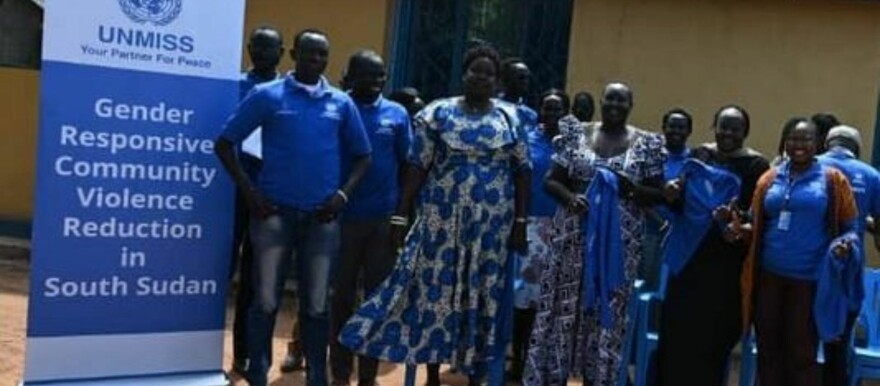A gender-responsive community violence reduction workshop organized by the United Nations Mission in South Sudan (UNMISS) field office in the Rumbek, Lakes State, concluded on Wednesday.
The two-day workshop attracted 55 participants including women parliamentarians, youth groups, and civil society organization representatives among others.
The speaker of the Lakes State Legislative Assembly, Agum Jacob Chagai, said the workshop was very beneficial and brought together all stakeholders including men.
“There are so many NGOs which organize trainings in the state in which we have talked a lot about issues of street children, the rights of women, and their 35 percent affirmative action. We appeal to the government to implement the 35 percent affirmative action in Lakes State and we need the ministry of gender and child welfare to address the issue of street children,” she said. “We have talked to the Rumbek mayor to come to the market because our women are not able to do business and the market is now occupied by foreigners. This is not good at all.”
The Speaker also stated that the 2018 peace agreement stipulates that elections be held and emphasized that they should be free and fair and respect the 35 percent affirmative action quota for women.
“The election needs to be free and fair and not ignore the issue of 35 percent affirmative for women and women must have the right to go and participate in 65 percent of all the geographical constituencies,” she added.
For his part, Samuel Dut Madit, an SPLM-IO legislator in the state parliament, said the workshop educated them about the need to empower women and support women’s rights.
“We are so happy to stand with our women in parliament and their workplaces and their rights are given by law,” he said. “Let us support women and let us take girls to school because they are the future of this country and have equal rights with men. They cannot be left behind. We should accord them (women) their rights so that they also exercise leadership in this country.”
The Lakes State minister for gender, child, and social welfare, Angelina Ding Mario, said the workshop discussed gender-responsive ways of reducing local violence and women empowerment.
“We discussed many issues about gender-responsiveness and women representation in the state and South Sudan in general. We also talked about how we can support ourselves as women and how we should lobby,” she stated. “We also discussed how we can reach the grassroots women, support them during the upcoming elections, and also to encourage girls’ education.”
“We the women need to support ourselves and encourage the women at home to also join leadership,” Ding added.
Meanwhile, Adama Njie, UNMISS’ gender officer at the Rumbek field office, said the workshop targeted state lawmakers and community leaders.
“We did it in both English and Arabic and it was the parliamentarians who were very interested. Most of them are very comfortable with Arabic and participated very well and they came up with very good recommendations which we hope we will be able to implement. UNMISS will give support to make sure that all these recommendations are implemented.” She said. “We are now working towards elections and participation, especially on the women’s side, is very important. That is why we are organizing these workshops in all states to give women the confidence to come out not just to vote or to support but to be candidates too.”
Rose Lisok Paullina, one of the facilitators of the workshop, said they targeted key leaders because they can bring about positive change and that the workshop was participatory.
We had two days of interactive discourse with the speaker of parliament, the minister of gender and child welfare, the advisor for gender, the chairperson of the caucus, and the chairman of the gender committee in parliament among others. These are the key people who can work for change and I think it is the start,” she said. “From the recommendations that they have made, they would like to have more capacity and they said that UNMISS should continue working with them and that this kind of workshop done for the grassroots people on the ground.”




